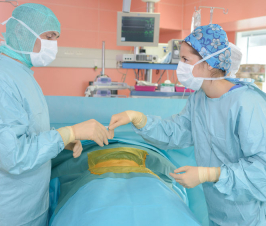Sprouts are certainly a delicacy, both nutritious and tasty. They are used in salads, sandwiches and dressings by many health conscious individuals. Every few years, recalls of sprouts make headlines, and information floods popular media regarding contaminated sprouts. Its very easy for sprouts to become contaminated. They are grown in humid and heated environments which are a perfect breeding ground for bacteria. But what is the risk?
According to theFDA’s Coordinated Outbreak Response and Evaluation Network (CORE), there were 48 outbreaks of illness associated with fresh sprouts between 1996 and 2016. Alfalfa sprouts were the most common contaminated sprout during the study period – 30 outbreaks. Clover sprouts accounted for six outbreaks, and another six were attributed to mung bean sprouts. There were also two outbreaks from sprouted chia powder, and two from unspecified sprouts.
The bacteria implicated in each outbreak predominantly was found to be either Salmonella or E. coli, with thirty-five and eleven occurrences respectively. Listeria was also found; only two cases.
Sprouts “certainly rank up there” on the list of produce items linked to outbreaks, said Kathleen Gensheimer, the director of the FDA’s CORE Network and the lead author of the study. The FDA currently recommends that people who are immunocompromised, or at risk for infectious diseases avoid eating raw or lightly cooked sprouts of any kind. This includes children, the elderly, pregnant women. For those eating sprouts, be aware of the possibility of contamination. This goes for purchased as well as home grown sprouts, bacteria doesn’t discriminate against your kitchen and large manufacturers; keeping surfaces clean and non-contaminated with meat, eggs, and other potential sources of bacteria is crucial. Consume sprouts soon after mature to minimize bacterial contamination.
Source:FDA CORE Webpage
 Node Smith, associate editor for NDNR, is a fifth year naturopathic medical student at NUNM, where he has been instrumental in maintaining a firm connection to the philosophy and heritage of naturopathic medicine amongst the next generation of docs. He helped found the first multi-generational experiential retreat, which brings elders, alumni, and students together for a weekend campout where naturopathic medicine and medical philosophy are experienced in nature. Three years ago he helped found the non-profit, Association for Naturopathic ReVitalization (ANR), for which he serves as the board chairman. ANR has a mission to inspire health practitioners to embody the naturopathic principles through experiential education. Node also has a firm belief that the next era of naturopathic medicine will see a resurgence of in-patient facilities which use fasting, earthing, hydrotherapy and homeopathy to bring people back from chronic diseases of modern living; he is involved in numerous conversations and projects to bring about this vision.
Node Smith, associate editor for NDNR, is a fifth year naturopathic medical student at NUNM, where he has been instrumental in maintaining a firm connection to the philosophy and heritage of naturopathic medicine amongst the next generation of docs. He helped found the first multi-generational experiential retreat, which brings elders, alumni, and students together for a weekend campout where naturopathic medicine and medical philosophy are experienced in nature. Three years ago he helped found the non-profit, Association for Naturopathic ReVitalization (ANR), for which he serves as the board chairman. ANR has a mission to inspire health practitioners to embody the naturopathic principles through experiential education. Node also has a firm belief that the next era of naturopathic medicine will see a resurgence of in-patient facilities which use fasting, earthing, hydrotherapy and homeopathy to bring people back from chronic diseases of modern living; he is involved in numerous conversations and projects to bring about this vision.

















